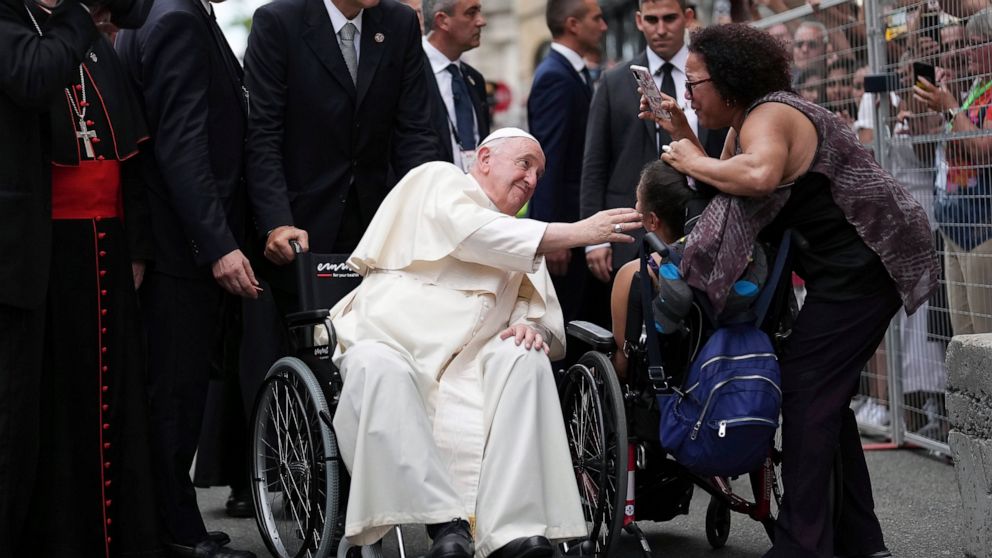QUEBEC CITY — Pope Francis on Friday assailed the Catholic missionaries who “supported oppressive and unjust policies” against Indigenous peoples and vowed to pursue truth and healing as he wrapped up his pilgrimage to Canada by meeting with Native delegations and visiting Inuit territory in far-north Nunavut.
Francis welcomed residential school survivors from eastern Canada to the archbishop’s residence in Quebec City to reiterate his apology for the abuses they suffered in Canada’s residential school system. From the late 1800s to the 1970s, more than 150,000 Indigenous children were forcibly removed from their homes and placed in church-run boarding schools to sever them from their cultures and assimilate them into Christian, Canadian society.
The Canadian government has said physical and sexual abuse was rampant at the schools, and Francis on Thursday begged forgiveness for the “evil” of clergy sexual abuse committed against young and vulnerable people, vowing an “irreversible commitment” to prevent it from happening again.
Francis is hoping his apology tour of Canada will help the Catholic Church reconcile with Indigenous peoples, and he has vowed to continue on a path of healing to atone for the past. His apologies have received a mixed response, with some school survivors welcoming them and others saying far more needs to be done to correct past wrongs and pursue justice today.
“I have come in a spirit of penance, to express my heartfelt pain at the wrong inflicted on you by not a few Catholics who supported oppressive and unjust policies in your regard,” Francis told the delegations in Quebec City. “ I have come as a pilgrim, despite my physical limitations, to take further steps forward with you and for you.”
Francis, who has been forced to use a wheelchair this trip because of painful strained knee ligaments, said he hoped to make progress in the search for truth “so that the processes of healing and reconciliation may continue, and so that seeds of hope can keep being sown for future generations – indigenous and non-indigenous alike – who desire to live together, in harmony, as brothers and sisters.”
Later Friday, Francis was bringing that message to Iqaluit, the capital of Nunavut, a vast territory straddling the Arctic Circle. It is the farthest north the Argentine pope has traveled.
Nunavut is roughly the size of Alaska and California combined, with a mostly Inuit population of about 40,000. The capital city has a population of 7,500, about half of whom are Inuit.
Francis was scheduled to meet with residential school survivors at a primary school in Iqaluit and then address Inuit youth and elders in his final event of the trip, aimed at delivering a message of hope for the future.
The Inuit community is seeking Vatican assistance to extradite an Oblate priest, the Rev. Joannes Rivoire, who ministered to Inuit communities until he left in the 1990s and returned to France. Canadian authorities issued an arrest warrant for him in 1998 on accusations of several counts of sexual abuse, but it has never been served.
The Canadian government said this week that Canada had asked France to extradite Rivoire, but did not say when and provided no more details.
Reaction to Francis’ visit has been mixed, with even the Canadian government saying his apology didn’t go far enough in accepting blame for the institutional role the Catholic Church played in supporting the school policy.
Some school survivors have accepted his apology as genuine and helpful to their process of healing from trauma. Others have found it still wanting, angered that it took the discovery of presumed unmarked graves outside some residential schools for the pope to apologize after Canada’s Truth and Reconciliation Commission in 2015 specifically called for a papal apology to be delivered on Canadian soil.
Still others have demanded the church do more, including provide further information about the fate of children who never returned home from the schools and repudiating the 15th century papal bulls that informed the so-called “Doctrine of Discovery” which legitimized the colonial-era seizure of Native lands for the sake of spreading Christianity.
“There were omissions in Pope Francis’s apology. No mention of ownership of the Catholic Church’s roll, only the Christians’,” residential school survivor Evelyn Korkmaz said on Facebook. “No mention in releasing residential school documents. No mention of revoking the Doctrine of Discovery. No mention in changing the rules or policies to assist clergy survivors to seek justice against their clergy predators. More action is needed.”
It is unlikely that the Vatican itself would hold records concerning the fate of Indigenous children who died at the schools, though it would have documentation on any priests who faced canonical penalties after 2001, and possibly some before then. If the documents exist, they would likely be in the archives of individual religious orders, including the Missionary Oblates of Mary Immaculate, which operated 48 of the 139 Christian-run residential schools.
———
Associated Press religion coverage receives support through the AP’s collaboration with The Conversation US, with funding from Lilly Endowment Inc. The AP is solely responsible for this content.

